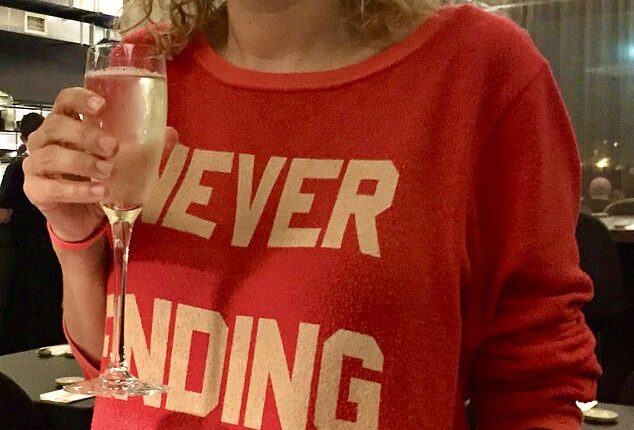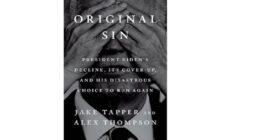A woman who was earning a six-figure salary and enjoying considerable success in her career has opened up about her battle with alcohol – and the extent to which she kept it hidden from those around her.
Sandra Parker, 56, who hails from Scotland and now lives in London, is a certified alcohol coach and founder of Just the Tonic. Now, her alcohol-free life is a far cry from her old approach to drinking.
Sandra began drinking started when she went to university at the age of 17.
While she had tried alcohol a few times before, it was during her student days that she started drinking more regularly, and in increasing quantities, Sandra told FEMAIL.
This time also saw a social shift taking place, one that would have a significant impact on the drinking habits of many – including Sandra.
The foundation of what would become an addition was laid against the backdrop of the rise of ladette culture, which saw young women rebel against societal expectations that confined them to roles that were demure by embracing more masculine behaviours like swearing, partying, and drinking heavily.
According to Sandra, the new trend was very different to how older women, like those from her mother’s generation, had been expected to behave, and it was ‘fun’ to try and keep up with the lads.
Her drink of choice at university was a half pint of cider with a large blackcurrant top to hide the taste of the alcohol.

Sandra Parker (pictured) would drink to excess, then feel awful about it when waking up after a big night out
When she graduated and moved to London, and lived in a house share with three other women, they used to drink an alcopop called Hooch, which they bought from the Waitrose across the road.
‘If you bought a certain number of bottles,’ she said, ‘they would give you a free glass, which we all thought was really cool.’
She also dipped into a cider called Diamond White that a friend introduced her to.
Describing an advert for the beverage, Sandra said: ‘There was a picture of two girls [who seemed drunk] and one of them was carting the other one around in a shopping trolley.
‘The slogan said they were having “a diamond night out”.
‘I think nowadays, that would have been seen as really quite shocking. But at the time, it was all a bit of a laugh.’
Her career, meanwhile, was going well – after moving down to London, she had got a job at an investment bank in Canary Wharf. Going from university to office, her environment had changed – but the drinking remained a constant.
She explained: ‘There was very much that sort of work hard, play hard culture, going out for drinks a couple of nights a week. If you got drunk, there was sort of a badge of honour when you went into work the next day.’

The popularity of ‘ladette’ culture, where young women would embrace traditionally masculine behaviours, like drinking to excess, played into Sandra (pictured) drinking a lot at university then work
Sandra continued: ‘I had a manager, and if we were going for a night out, and someone asked whether we were going for something to eat, he would say “eating is cheating”.’
‘I don’t think people would get away with that now, but then, it was very much like you had to prove yourself, and be able to hold your own.
‘And I’m not very tall, I’m about 5’3” and about eight stone, so many of the guys were much bigger than me, and there weren’t many women working there. Because it was a career thing, you felt like you were quite sophisticated, but it was still very heavy drinking.’
Apart from the booze-fuelled weekday evenings, Sandra live a healthy life; she would eat well and go running – even taking part in several half marathons as well as two full marathons (she ran one of them after drinking the night before).
‘I think the weekend running was a good way for me to de-stress. I was never particularly sporty at school, but I had quite good stamina for running, and I quite enjoyed it,’ she said.
‘I think that was also part of drinking culture as well, because, like, I was in a running club, and it was seen as a badge of honour that you finished a run, and you had a few drinks.’
She added that she would sometimes follow eating plans, or exercise regimes, but while she would stick to everything the plan recommended, she would ignore anything about giving up alcohol.
Sandra explained: ‘As I was getting older, I was interested in feeling healthier, but alcohol was a bit of a blind spot. And I didn’t realise how much it had a grip over me. I thought I was being quite clever by ignoring the alcohol part and focusing on the other parts [of a healthy eating and exercise regime].’

After enjoying cider and blackcurrant, and alcopops in her early twenties, as she grew older, Sandra started drinking expensive wine, and tell herself that her drinking was sophisticated
As she continued to succeed at work, with regular promotions and a six-figure salary to boot, she traded in alcopops and cider for something stronger – and more sophisticated.
‘There’s a place in London called The Wine and Spirit Education Trust,’ she said.
‘And I did a wine tasting course there, and I’d been to Sonoma Valley, and had a friend who was a real wine connoisseur. I used to go out with him, and a crowd of others, and we would pretend that we were really sophisticated.’
However, she added, while she said she only drank ‘really good quality wine’, if she went on holiday, she would drink whatever was available.
Sandra explained: ‘If I look back, I just wanted the hit from the alcohol.’
There were times when she would be concerned how much she was drinking.
‘From time to time, I would wake up and I would feel absolutely horrendous,’ she said.
‘I would never go out and plan to get drunk, but there would be times I would wake up and wouldn’t quite remember the night before.

Alcohol was a major source of enjoyment for Sandra (pictured) whether on nights out, or on holiday
‘I would have described myself as an anxious person, and I used to have panic attacks when I was a student, and I would get this horrendous anxiety the [day after getting drunk], and when I felt like that, I always wanted to learn how to control alcohol.’
She added: ‘I never really wanted to get drunk, but at no point did I ever, ever consider giving up. And what happened was, as I was getting older, I think the hangovers were affecting me worse, and I noticed my moods were affected too: I was getting really down and I remember deciding to try harder to moderate my drinking as I still didn’t want to give up.
‘The thought for me, of not drinking was horrific. To be honest, I thought I would be incredibly miserable, and it sounds like odd now, but I just thought there wouldn’t be any point in life if I couldn’t drink alcohol. So [giving up] was never, ever something I wanted to do.’
She added: ‘I was really good at convincing myself that feeling that way was normal. I know it sounds ridiculous now, but when I look back, I deliberately avoided people, say at work, who didn’t drink. I think there was a part of me that thought “they’re not any fun”.
‘I would try and find ways to convince myself that my attitude to drinking was healthy and that people who didn’t drink just didn’t know how to enjoy themselves. So I think I did recognise that it was a bit of a problem, but at the same time, it wasn’t something that I was that constantly aware of.’
On what the people around her thought about her drinking, Sandra said she tried to dismiss it as a serious issue.
‘It wasn’t like I was getting drunk every night and falling over. But let’s say that after work, I got really drunk,’ she said. ‘The people I socialised with at the weekend didn’t really know. I also tried hard to pretend that I didn’t feel that bad the next day. So from time to time, people would say, “you’re drinking a bit too much”.
‘But there were ways where I was probably hiding it…If people said, “oh, you got really drunk last night,” I would say that I had felt fine. I would never, ever admit it. I would feel embarrassed.’

Sandra (pictured) got to a point where she was being a bit deceptive about how much alcohol she was consuming
However, Sandra got to a point where she knew she ‘needed to get control’.
She decided to follow a Dry January-style programme, ditching alcohol for a month, but throughout that time, she was planning to return to drinking once the designated time period was over.
Sandra explained: ‘I was really sick of hangovers. At the time, I was working with a really good life coach, and had been doing a lot of work on my mindset.’
Abstaining from the drink, Sandra started to feel better, and started to think that she should try to stay away from alcohol for longer. She said: ’My plan was to be alcohol-free for six months and then a year. But I still really wanted to moderate [my alcohol intake] after that.’
But after she’d abstained for around six months, one of her friends said to her: ‘I can’t wait to go out, to go out with you after the year’s up. ‘
Sandra said: ‘I turned around her and I said, “I don’t think I’m going to go back to drinking”. When I said it out loud, I was quite shocked, because I hadn’t really thought about it. But I thought, “Why would I go back?”
‘I think part of me was worried that I wouldn’t be able to moderate, but the other part of me couldn’t deny that I was happier. I was like, surprised – I was quite shocked, really, to be honest. But I thought, “Look, you wanted to moderate, but like, let’s be honest, you’re a lot happier now, so why not just keep going?”.’
That was seven years ago, and Sandra hasn’t drunk alcohol since – which led to another major life change.

Sandra (pictured) hadn’t planned to leave her job and become a full-time coach, but things changed after Covid, so she decided to go for it
‘In the job that I was doing, I managed people, and I had always enjoyed doing that. I had trained to become a coach, and I was thinking that coaching is something I may do part-time after retiring.
‘It had given me the chance to train to help people to get control over alcohol, which is something I was really fascinated by.’
And then the pandemic happened.
‘Covid was like a big shift,’ said Sandra, ‘because I could see how many people were struggling, people’s alcohol intake just seemed to shoot up. At the same time, the company I worked for gave us the opportunity to take redundancy. So, I had learned how to become a coach. I could see all these people were struggling, and I thought, “Why not?”
‘I’d never planned to do this full time, but it just felt like the right thing to do. If I’d spoken to you 10 years and you said I was drinking, I would have thought “you’ve got me mixed up with somebody else”.
‘If you told me that I was going to be helping other people stop drinking, I would have been really shocked.’
Despite being such a major change, leaving her old job to embark on a career as a certified alcohol coach was such a major change, but as Sandra says, ‘felt like the right thing to do’.
The people she works with come to her, which means they have identified that their drinking is an issue, and are in the mindset of wanting to stop. Sandra added: ‘The people I work with are pretty high-achieving, and they’re not at rock bottom.’
Describing her typical clients, she said they had ‘high standards’ for themselves, were usually over-45, and beginning to worry that heavy drinking might be impacting their health.
‘Or sometimes they’re just realising that for their job, the mental clarity that they need, they’re not going to be able to maintain it,’ she continued.
Because the people Sandra works with are successful, it is often easier for them to hide their drinking behind upmarket activities – like expensive wine tastings. Sandra added: ‘There are clients I have worked with who have had wine fridges, who have been really into wine tasting.
‘And there’s definitely a demographic where people are able to kind of fool themselves because they’ll say, “I never touch spirits, or I never drink before six o’clock, or I only drink quality red wine”.
‘And there are so many ways that when we do that, we can tell ourselves that alcohol is just a harmless, sophisticated indulgence. But the reality is, it doesn’t actually matter what type of alcohol it is.’
She noted that when people start to get defensive about their drinking, or try and justify it, there is ‘probably something there’, that needs further looking at.
When it comes to the best way to tackle problem drinking, Sandra said: ‘I think some people worry about whether they are an alcoholic. And I think what’s good to know is that the doctors don’t use that term anymore, so they would talk about Alcohol Use Disorder.
‘So when I’m speaking to people, what I tend to ask is, “Are you drinking more than you want?”. I think that’s the first question to ask, because then the amount becomes a bit irrelevant, and it’s about whether the person is regularly drinking more than they want.’

Now, some seven years after ditching alcohol, Sandra (pictured) wants people to know that there is a different way to approach quitting
If they reply affirmatively, she continued, Sandra asks them: ‘What would it feel like right now if someone said to you, “Don’t drink for a week or a month?”
For most people, if they don’t have any problem with alcohol, that shouldn’t be an issue, she continued.
‘But if you suddenly thought of all the reasons why you wouldn’t be able to give up for a week or a month, then that’s a sign that is taking a bit of a hold,’ Sandra explained.
Her best advice for people trying to control their drinking is simply to be honest with themselves and ‘not to try and normalise’ the habit.
Sandra added that she recommends people cut their drinking down over a period of time, and while doing so, they may notice why they’ve been drinking, and what they are trying to numb by drinking to excess – whether that is work stress, boredom, or something else.
There is still a stigma around alcohol misuse, according to Sandra, who said one of the things clients often say to her is that she is the first person they’ve spoken to about their drinking.
She added that it is ‘incredibly rewarding’ when people give up alcohol, and you see them go from struggling to seeing their confidence and quality of life surge.
For people who are struggling with drinking, Sandra said: ‘If people have tried to cut down before, and have framed it as being really hard, and making them miserable, then there is a different way to do it.
‘I focus on helping people change their mindset, because if you’re not bothered about alcohol, then you don’t feel deprived.
‘There’s definitely a way that we can look at the different reasons why people are stuck, and we can change those beliefs. And if you change those beliefs and you don’t want to drink, you’re going to be so much happier than trying and failing with willpower. If somebody had told me that 20 years ago, I would have been delighted.’









